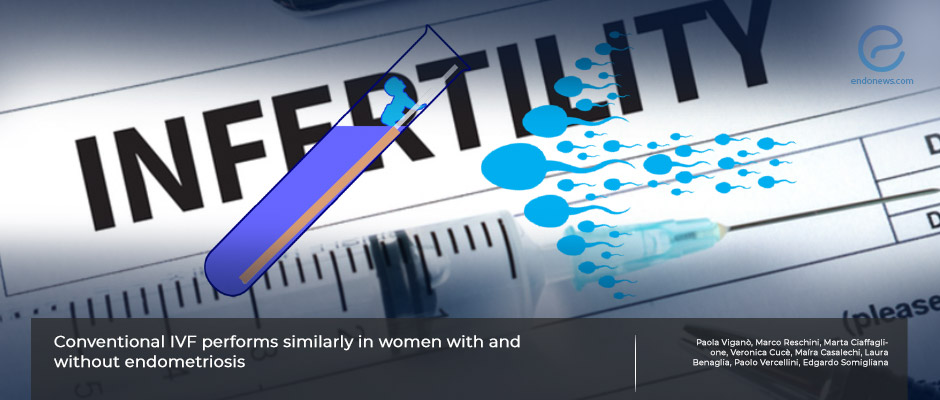Conventional IVF or ICSI: Which one is more accurate in endometriosis-related infertility?
Feb 23, 2023
Conventional IVF treatment has similar pregnancy success in endometriosis patients if there is no other cause of infertility.
Key Points
Highlights:
- The presence of endometriosis does not adversely affect the success of IVF treatment regarding total fertilization failure, fertilization rate, embryo quality, cumulative clinical pregnancy, and live birth rates.
Importance:
- Women with endometriosis should be appropriately informed that conventional IVF has similar success to those having no endometriosis.
What’s done here?
- This retrospective matched case–control study was conducted to evaluate the success rate of conventional IVF treatment in women with endometriosis compared to those without endometriosis.
- Reproductive-aged infertile women with endometriosis who underwent in vitro fertilization (IVF) treatment were recruited as the study group.
- Endometriosis was diagnosed by ultrasound evaluation or histopathological examination following the operation.
- Age-matched women having no suspicion of endometriosis and taking IVF treatment due to unexplained infertility, tubal factor, ovulatory disorders, and reduced ovarian reserve were included as the control group.
- All patients were assessed by experienced clinicians and the decision between IVF and ICSI was taken by the embryologists on the day of oocyte retrieval considering the patients’ characteristics.
- All participants were selected from patients with normozoospermic partners.
- The total number of retrieved oocytes, total fertilization failure rate, fertilization rate, the number of cleavage stage embryos, the number of blastocysts, blastocysts, pregnancy rate on fresh embryo transfer, implantation rate, and cumulative pregnancy rate were investigated as the main outcomes.
Key results:
- 314 patients were included in the study and evaluated in two groups (157 with moderate-severe endometriosis and 157 patients without endometriosis).
- The study group had lower body mass index (BMI), higher anti-Mullerian hormone (AMH) levels, and a shorter duration of infertility.
- Endometriosis patients were treated more frequently with the GnRH agonist compared to the control group.
- There was no significant difference between the groups regarding total fertilization failure rate, fertilization rate, the number of cleavage stage embryos, and the number of blastocysts.
- Similar clinical pregnancy rates following fresh embryo transfer and cumulative pregnancy, implantation rates, and live birth rates were obtained from both groups.
- The only significant difference was the higher number of top-quality cleavage-stage embryos in the endometriosis group compared to the controls.
Limitations
- The retrospective design could be accepted as the main limitation of this study.
- Another limitation was that most of the participants in the control group underwent IVF treatment with the indication of unexplained infertility, the presence of minimal endometriosis in these cases could not excluded.
Lay Summary
Although the prevalence of endometriosis is 10-15% in the general population at reproductive age, it is diagnosed more frequently in infertile women with a prevalence of 25-40%. Although the exact mechanism explaining the association between endometriosis and infertility has not been elucidated, distorted pelvic anatomy, impaired ovarian function, altered microenvironment, affected endometrial receptivity and embryo quality have been proposed as the responsible mechanisms.
Infertility in women with endometriosis is managed most commonly by assisted reproductive technology (ART) modalities including in vitro fertilization (IVF) or intracytoplasmic sperm injection (ICSI). The decision for IVF or ICSI is made based on the patient's demographic and clinical characteristics and previous ART outcomes.
A group including Dr.Vigano et al, from Italy and Brazil, published a study entitled “Conventional IVF performs similarly in women with and without endometriosis” in the Journal of Assisted Reproduction and Genetics. These authors sought to investigate whether there was any difference in terms of conventional IVF treatment success in women with and without endometriosis in the presence of normozoospermic partners. Endometriosis patients were matched with patients undergoing IVF treatment for any other indications as the control group.
There was no significant difference between the groups regarding total fertilization failure rate, fertilization rate, the number of cleavage stage embryos, and the number of blastocysts. Both groups did not differ significantly regarding clinical pregnancy rate following fresh embryo transfer and the cumulative pregnancy, implantation rates, and live birth rates. The only significant difference was the higher number of top-quality cleavage-stage embryos in the endometriosis group compared to the controls.
“Conventional IVF can be efficiently used to treat affected women unless a male factor is also involved.” the authors added.
Research Source: https://pubmed.ncbi.nlm.nih.gov/36637584/
endometriosis In vitro fertilization (IVF) conventional IVF intracytoplasmic sperm injection (ICSI). Assisted reproductive technologies (ART)

